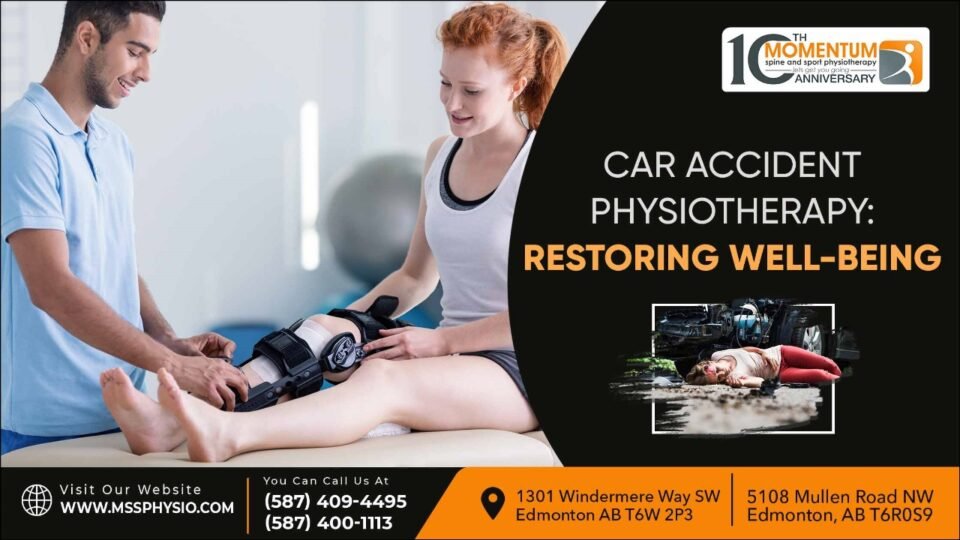The moments after a car accident can be disorienting, filled with confusion, anxiety, and overwhelming concern about one’s health. While immediate medical attention deals with visible wounds and broken bones, the long-term repercussions of the trauma on musculoskeletal health are often overlooked. Here’s where car accident physiotherapy steps in a specialized domain in the broad field of physiotherapy tailored to address motor vehicle accident injuries. With facilities such as Momentum Physiotherapy offering dedicated Motor vehicle accident physiotherapy Windermere, residents have access to specialized care designed to restore their health and well-being.
The Invisible Aftermath of Car Accidents
In the aftermath of a car collision, some injuries might not be immediately apparent. The shock and adrenaline can mask pain, with symptoms like reduced range of motion, stiffness, and even cognitive impairments surfacing days or even weeks later. This latent onset is typical with whiplash, a common injury in rear-end collisions, where the rapid back-and-forth movement of the head strains the neck muscles and ligaments.
Why Seek Motor Vehicle Accident Physiotherapy?
Car accident physiotherapy isn’t just about addressing immediate discomfort. It’s a comprehensive approach to:
- Evaluate the full extent of soft tissue injuries and musculoskeletal misalignments.
- Plan a personalized rehabilitation regime targeting the specific needs of the patient.
- Facilitate recovery through various therapeutic techniques, ensuring optimal healing and reduced risk of long-term complications.
The treatment strategy integrates evidence-based techniques with cutting-edge advancements in rehabilitation sciences.
Setting Goals: The Road to Recovery
Experiencing a car accident can profoundly shift one’s life, introducing both physical pain and emotional trauma. Physiotherapy extends beyond mere physical rehabilitation; it encompasses the journey of regaining one’s sense of self and well-being.
Short-term Goals: These are immediate, achievable targets that build confidence and motivation. For a patient with a sprained ankle from a car crash, a short-term goal might be to regain enough mobility to walk without pain or to perform daily tasks without assistance.
Long-term Goals: These are more comprehensive objectives that require time and perseverance. Using the same example, a long-term goal could be to return to pre-accident activities, like running or dancing.
The physiotherapist and the patient collaborate, factoring in the individual’s aspirations, lifestyle, and the nature and extent of the injuries. Regular reviews ensure that these goals remain relevant and challenging, allowing for adjustments based on progress.
Therapeutic Interventions in Car Accident Physiotherapy
The interventions range from manual therapies to alleviate pain and mobilize joints to personalized exercises to rebuild strength and flexibility. Some popular treatments include:
- Manual Traction: Often used to treat whiplash, it involves gentle pulling of the neck to stretch the spinal vertebrae, relieving pain and improving mobility.
- Ultrasound Therapy: Helps in reducing muscle pain and stiffness by enhancing blood circulation to the injured site.
- Electrotherapy: Utilizes electric signals to decrease pain, promote healing, and strengthen muscles.
- Neuromuscular Re-education: This focuses on regaining the coordination and balance that might be affected post-accident. It involves functional and dynamic exercises that challenge and enhance the neuromuscular system.
- Aerobic Conditioning: Tailored aerobic exercises help improve cardiovascular health, enhance lung capacity, and can play a role in speeding up the overall healing process.
- Postural Training: Emphasis on teaching correct postural habits to prevent further strain and ensure optimal healing.
- Functional Retraining: This ensures that individuals can safely return to their daily activities, including work, by focusing on the specific demands of their routine.
Lifelong Impact of Timely Intervention
Delaying physiotherapy after a motor vehicle accident can potentially result in chronic pain, restricted mobility, and a reduced quality of life. Establishments offering car accident physiotherapy in Windermere emphasize early intervention. Timely therapy not only accelerates healing but also mitigates the risk of future complications.
Home Management and Self-Care Tips
- Exercise Consistency: Adhere to physio-prescribed exercises regularly to speed up recovery.
- Ergonomic Living: Adjust living spaces post-accident for comfort, such as using supportive cushions or modifying workspaces.
- Balanced Activity: Gradually reintroduce movement post-accident, but avoid overexertion.
- Mental Care: Address the emotional aftermath of an accident with relaxation techniques or counselling.
- Nutritional Healing: Boost recovery with anti-inflammatory foods, ample hydration, and limiting processed foods.
With the right self-care and guidance from professionals, recovery becomes a smoother journey.
Navigating the Recovery Pathway
Recovery is a journey. And, like all journeys, it requires patience, determination, and the right guidance. With the expert care at physiotherapy facilities, individuals find themselves equipped with tools and strategies to reclaim their well-being, ensuring that the aftermath of an accident doesn’t define their future but serves as a testament to their resilience and the efficacy of dedicated professional care.
Driving Forward: The Path to Holistic Recovery After Auto Accidents
Motor vehicle accidents can alter the trajectory of an individual’s life, presenting challenges both seen and unseen. But with dedicated motor vehicle accident physiotherapy Edmonton, especially in establishments like Momentum Physiotherapy in Edmonton and Windermere, there’s a roadmap to restoration. It’s a journey from injury to recovery, navigated hand in hand with experts, ensuring that every step taken is one towards holistic well-being.


